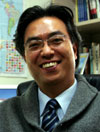Joining international organizations as a member of the leading group
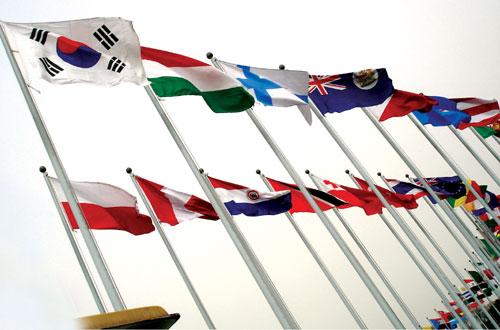 | ||
A Korean running for UN secretary-general was inconceivable in the past. In addition to Ban's personal competency, the escalating global image of Korea has helped his good reputation a great deal. The country has been developing as a role model among developing nations with its rapid growth in economy and democracy. By overcoming such deadlocks as the Asian financial crisis (or the IMF crisis) in 1997 as well as constant interventions from North Korea, China and Japan, Korea has managed to join the trillion dollar club of world economies. Korea, as a divided nation, is also striving globally to achieve peaceful and gradual reunification. Accordingly, the roles of international organizations within the nation are becoming more relevant than ever.
IOs: the meaning 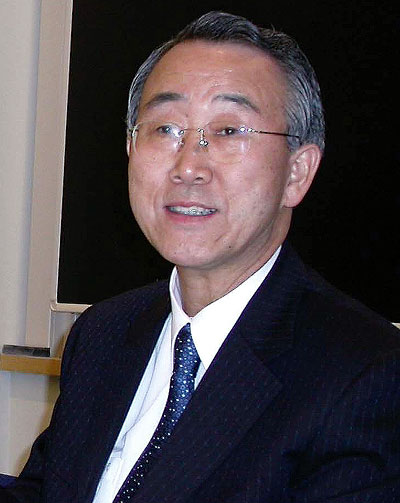
▲ Ban Ki-moon, the current minister of MOFAT, is running for the next UN secretary-general.(From MOFAT)
International organizations are membership groups representing the interests of more than one nation that operate within certain boundaries, but maintain a common purpose. Modern IOs (International Organizations) consist of IGOs (Inter-Governmental Organization) such as the European Union and the WTO, and NGOs (Non-Governmental Organization) such as Green Peace and the Red Cross.
Thought to be coined by Jeremy Bentham (a renowned English philosopher and political theorist), the word "international" is often seen as a misnomer. It is suggested the term "intergovernmental" be used instead to describe such activities like diplomacy, war, etc. These days, however, the belief has grown that the term should not be used ambiguously with the word "intergovernmental," because intergovernmental means relations between the official representatives of sovereign states. The activities in lieu of governmental relations are known as "transnational relations." On the other hand, the connections between one branch of government in one state and a branch of government in the other that do not go through the normal foreign policy-making channels are called the "trans-governmental." All these relationships- intergovernmental, transnational and trans-governmental- are now contained under the term "international."
The use of the term "organizations" goes along with international relations because relations between governments, groups or individuals are not just chaotic but are organized in specific ways. "Organizations" is easily confused by the dual meanings of its singular form. Prof. Inis Claude, makes the following distinction in his book "Swords into Plowshares: The Problems and Progress of International Organization": "International organization is a process, indicating that international organizations are representative aspects of the phase of that process which has been reached at a given time."
IOs: the roles and functions 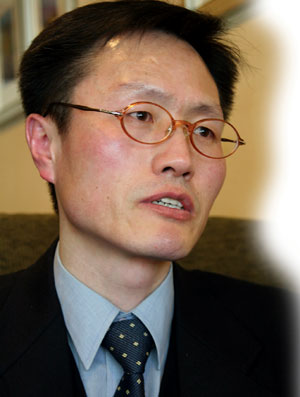
▲ "Korea is the best role-model for developing countries."
- Jung Sang-hyun (Pres. Public Relations Team of 2006UN.org)
(Photographed by Chai Kyu-min)
The most conspicuous role of international organizations is that of an instrument being used by its members for a particular purpose- to resolve domestic conflicts. Gunnar Myrdal, a former Executive Secretary of the UN's Economic Commission for Europe, states, "They are something more than their component parts: something above the national states." Most of the organizations have had this purpose, due to the conflicts within the countries that cannot be solved by governments themselves.
A second image is of arenas or forums within which discussions, arguments, cooperation, or disagreements take place. In this case, the organizations provide meeting places for members to convene. The 2005 APEC (Asia-Pacific Economic Cooperation) held in Busan, provides an example of a well-coordinated summit between Asian-Pacific countries.
The third role is an independent actor. "Independent" in this phrase means that international organizations- or at least some of them- can act on the world scene without being significantly affected by external forces. Karl Deutsch (a German social and political scientist) defines the "international organization" as "stable and coherent decision-making machinery existing within its boundaries." A number of international organizations such as the FTA (Free Trade Agreement) clearly fit in this description.
International organizations can perform the task of interest articulation and aggregation in international affairs just as people do in a national political system. They also set the norms of international community, make, apply and adjudicate the rules.
Korea's position
Korea is a "leading country" in innovation, on a level with advanced countries according to the OECD (Organization for Economic Cooperation and Development)'s Feb. 7 2006 report. It claims that "Korea performs well above average in terms of business R&D (Research & Development)."
In 2005, APEC was held in the port-city of Busan. The main agendas for the summit were confronting pandemic health threats and continuing to fight against terrorism. Being able to hold this significant conference states that Korea has become one of the leading countries in the world. Media around the globe paid their attention to the small country in East Asia, pointing out a brief history of Korea's rapid development in economies.
Korea is not only hosting international conferences as a part of its in-bound globalization plans, its people are known globally as substantial managers in international public services. Lee Jong-wook, for example, is currently working as Director-General of the WHO (World Health Organization). WHO is the UN specialized agency for health and has the most amount of budget among the UN bodies. He is the first Korean to be nominated and elected in the UN bodies. Lee's taking charge of the WHO office implies that Korean's role in international community is changing for the better.
"Korea is one of very few countries which can satisfy the developed nations as well as the developing nations," comments Jung Sang-hyun (Pres. Public Relations Team of 2006UN.org)
"Many leaders from all over the world are expecting a Korean secretary-general to take the office. It is true that Korea is the best role-model for most of the developing countries for its stabled democracy and fast-speed economic development."
Korean students in the world stage 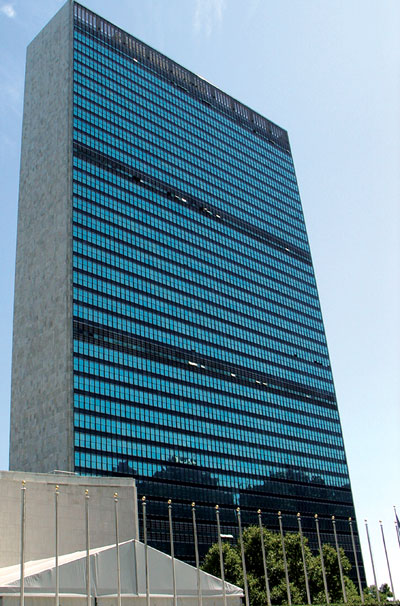
▲ The UN headquarters in New York.
International organizations are membership groups representing the
interests of more than one nation that operate within certain boundaries, but maintain a common purpose.
"We have a tendency to emphasize nationalism because Korea is the only nation consisting of a single ethnic group. We, however, can say that it could be one of our weakest points in globalization," argues Kim Jung-hoon (Pres. of Korean University Students Politics & Diplomacy Research Association). "I suggest that every Korean on the peninsula adopt a global mindset due to the upcoming vortex of globalization."
Many students currently work hard on becoming a leader in their community. They manage to participate in various kinds of internships and camps to build their leadership skills. However, they tend to brush aside the importance of becoming internally globalized.
We, as university students, have a responsibility to lead the upcoming decades of globalization. Also, international organizations are to show more momentums. It is a chance for us, Korean students to participate and become a part of those organizations in order to escalate changes for the better.
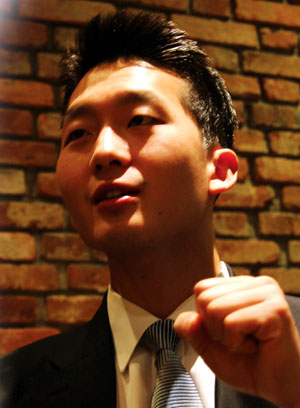 | ||
| ▲ A need for a global mindset is vital for the future. - Kim Jung-hoon (Pres. of Korean University Students Politics & Diplomacy Research Association)(Photographed by Le Yang-jung) | ||
| Prof. Kim Woo-sang Q: Why are international organiza-tions such as the UN and the NGOs important? Q: In this fast-changing era, the term "global governance" appeared. What is the meaning of global governance? Q: What are the things we need to prepare for global society? | ||||||||||||


